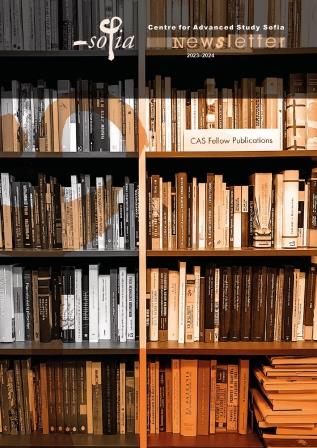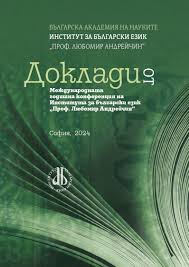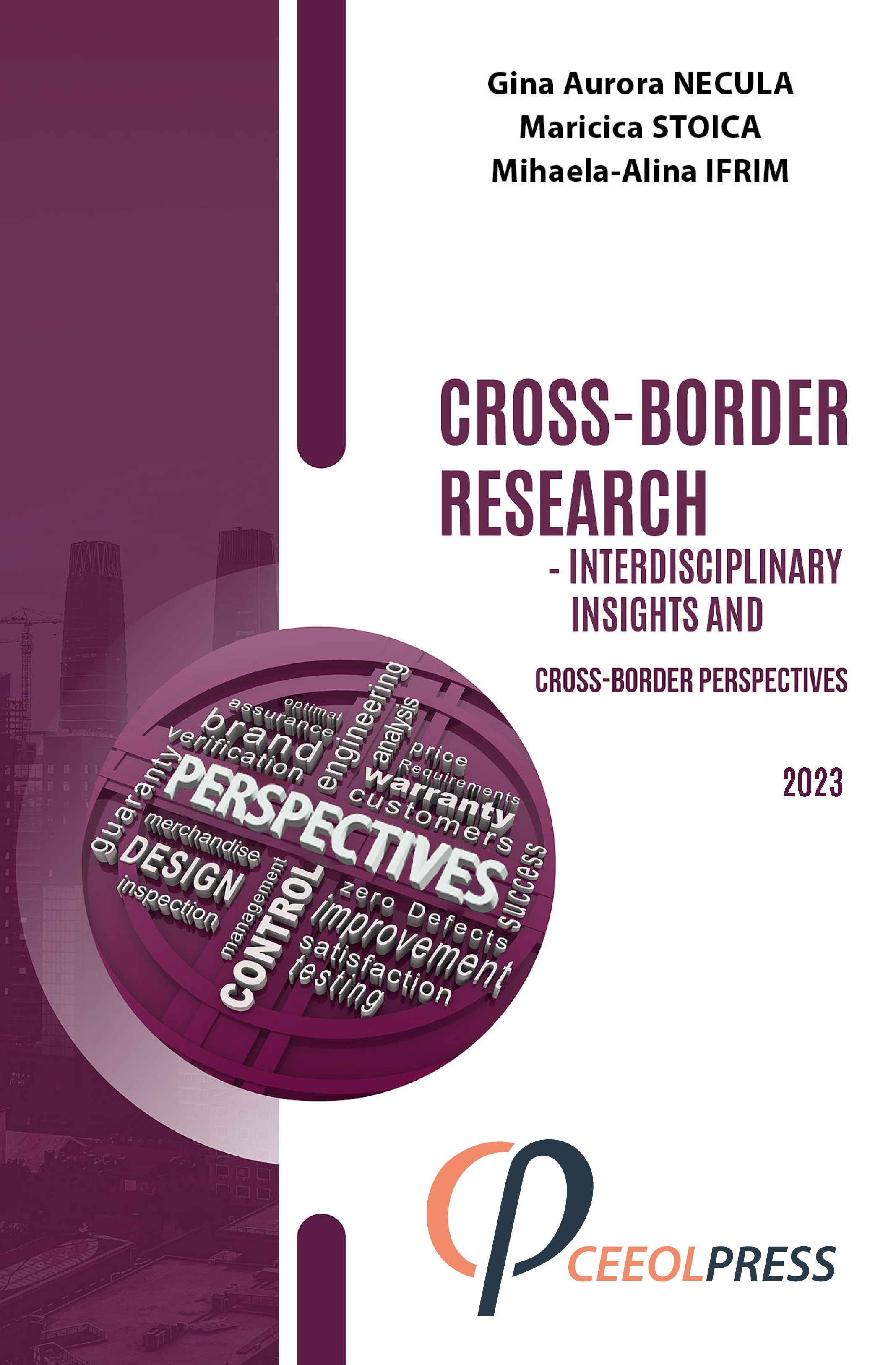
CAS Newsletter 2023/24
Articles, pictures and interviews can be reprinted only with the consent of the publisher.
More...We kindly inform you that, as long as the subject affiliation of our 300.000+ articles is in progress, you might get unsufficient or no results on your third level or second level search. In this case, please broaden your search criteria.

Articles, pictures and interviews can be reprinted only with the consent of the publisher.
More...
The article treats the argument structure of desiderative predicates in Bulgarian as a subclass of psychological state predicates. Their possible complements – nominal phrase, prepositional phrase or a complement clause – are presented. The observations are based on the syntactic realization of the predicates искам ‘want’, желая ‘wish’, надявам се ‘hope’. The referential structure of the predicate arguments is taken into account. A conclusion about the syntactic realization of this subclass of predicates in comparison with the syntactic realization of other predicates with experiencer subject is made.
More...
The present work examines the influence of the context and/or the situation on the realization of noun and verb categories in modern Bulgarian. These cases are considered as contextual restriction, implementation of a blocking strategy, or as syntagmatic neutralization of a feature or features on which a given grammatical category is based. Cases of context restriction are presented for the noun categories number and indefiniteness/definiteness and for the verb categories number, aspect, tense, mood, evidentiality, and presumptiveness. The research proves that it is not possible to restrict the categories of person, gender and status (positive - negative verb forms).
More...
The present study investigates the effect of sex and age on the temporal characteristics of read Bulgarian speech, as well as the impact of different methods of measuring speaking rate. The analysed material is continuous read speech from the multilingual speech database BABEL. Three cognitively linked short passages containing 5thematically related sentences were read by 60 speakers (30 male and 30 female). The total length of the analysed material is 70.14 minutes. The results of the statistical analysis, carried out using linear mixed models (LMM),show that speaking rate decreases with age for both sexes, with men speaking faster than women. No significant differences were found in the proportion of pauses. The study provides reference data on speech rate, articulation rate, and pausation in read Bulgarian speech, thus establishing a foundation for future comparisons and analyses.
More...
The paper offers a comprehensive analysis of the structure and distribution of Bulgarian indefinite multiword expressions following the pattern ne znam (si) k-word (si) (NEG know.1SG.PRS (REFL) k-word (REFL)). The syntactic behavior of each member of the series is illustrated with numerous examples from Internet discourse.While it is possible for an adverb or even a preposition to occur within the complex, these expressions fill in positions available to pronouns, not to clauses, and denote specific non-identifiable referents. Therefore, ne znam (si) k-word(si) expressions should be categorized as compound indefinites.
More...
he text examines some metaphors in the media discourse that build the image of politics as a process and the politicians in it. It represents an observation of language in print media over the past 3 years.
More...
The article presents personal seals from Bulgarian settlements in the South-Eastern Rhodopes and in Western Thrace dating from the end of the 19th and the beginning of the 20th century. The inscriptions of the seals,their graphic features and their layout are examined. The writing patterns of the anthroponyms on the personal seals and in the texts on which they are placed are described.
More...
As an object of research, the lexical richness of the South-Western Bulgarian dialects attracts a considerable philological interest on behalf of such prominent figures as Yordan Hadzhikonstantinov-Dzhinot, Stefan Verkovich, Lyuben Karavelov, Vasil Cholakov who focus upon both public life and relation between the written and spoken form of the language characteristic of the third quarter of the 19th century. This richness is studied in a number of publications to be found in the periodicals from that period and presented in the form of integral components or small dialect dictionaries appended to the folklore collections. This interest is provoked by the archaic traits of these dialects preserving vivid traces of the old Bulgarian heritage, on the one hand, and, on the other, by the focus on the Bulgarian dialects characterizing the period of Bulgarian national revival in connection to the establishing of the standardized Bulgarian literary language in which, to a greater or lesser extent, the characteristic features of the Eastern Bulgarian dialects start to dominate in the new linguistic normativity.
More...
The paper is a continuation of the author’s long-term research, in which an attempt was made to collect and classify the ethnocultural lexicon related to the Ethnolinguistic Dictionary of the spiritual and material folk culture of the Bessarabian Bulgarians in Ukraine. The terminology of the culinary lexicon of the Bulgarians in the diaspora is an expression of the national specificity of the culture, and in this sense, its study is prospective within the emerging trends of European thinking from the beginning of the 21st century. The gathered lexical material is formed as a corpus of folk terms related to the culinary lexicon of the Bessarabian Bulgarians.
More...
Based on authentic materials from the Romanian Linguistic Atlas (ALR II s.n.), examples of Romanian words are selected from the semantic field of water, fishing, and fish names. We focus on words of Slavic origin,more specifically, words with a Bulgarian and an Old Bulgarian etymology. Besides their linguo-geographic distribution and their areal properties – such as a wide distribution or limited attestation in the form of a so-called relic island – we examine: What other synonyms with non-Slavic etymologies does the respective word have, and can certain patterns be identified? In addition, we look at the phonetic variability of words and typical word formation processes. Furthermore, we attempt to draw possible conclusions about the region’s historical development. In their unpublished talk of 2016, Dahmen, Popovici conclude that most of the fish names in these areas are of Slavic origin,which testifies to the intensive settlement of Slavs in the lowlands and on the banks of the Danube River, which is supported by archaeological findings. It also confirms the traditional local Bulgarian-Slavic subsistence strategy of fishing. The word roots of many fishing terms are traceable back to the times of the Proto-Slavic homeland, so again we can confirm that fishing was a typical subsistence strategy of native Slavs.
More...
The article examines the antonyms in the field of the concept TOLERANCE. Survey data are analyzed seeking an answer to the question of how the Bulgarians perceive tolerance, whether they accept it as a value. Groups of antonyms united by a common semantic feature are derived, as well as the leading oppositional pairs that build the attitudes of the modern Bulgarians. Nationally specific stereotypical signs of this value-marked concept are revealed.
More...
he article presents the associations that the concept of the individual evokes in the minds of the Bulgarians. The actual analysis includes complex of judgments registered in the surveys showing the concepts of modern man. The free association experiment included 100 people – men and women with different education, who presented the studied concept from a modern point of view.
More...
The article examines the history and usage of a specific type of phraseological units with a component гарван, врана / kruk, wrona (‘raven’, ‘crow’) in Bulgarian and Polish. These phraseological units have a common origin related to the ancient cultural heritage of European nations and initially share a close meaning. However, their development in the two languages takes different paths, leading to the emergence of interlinguistic asymmetry. The conducted research demonstrates that interlinguistic equivalence relationships in phraseology are dynamic and can change over time depending on the characteristics of intra-linguistic developmental processes.
More...
The paper discusses different types of situations in which the possessive group u + genitive is used to encode the subject. In Russian, such a group can be a marker of a wide range of subjects, including possessor (У него две собаки ‘He has two dogs’); experiencer subject of internal states (У меня было чувство/подозрение, что Р ‘I had a feeling/suspicion’), subject of involvement (У нас пожар ‘At our place we have a fire’; У него обыск ‘They conduct a search at his place’; У меня чайник перегорел ‘My kettle got burnt’), agent referent in situations with suppressed or lost control (У меня встреча ‘I have a meeting’; У меня мотор не заводится ‘My motor does not start’). Due to the coding of the subject by the u-group, all such situations receive a pseudo-possessive conceptualization. The Bulgarian correspondences to these Russian constructions have been analysed on the material from the parallel corpus.
More...
As one of the key questions of contrastive phraseology, the question of equivalence arises, i.e. the coincidence of idioms in two or more languages. The present text develops already existing typologies of cross-linguistic phraseological equivalence on the basis of Bulgarian and Croatian phraseology. Structural-semantic equivalences, partially structural equivalences with matching semantics, semantic equivalences, and also null equivalence are defined. The criteria for determining the type of equivalence are: structural, semantic, motivational (background aspect), stylistic and use criteria.
More...
The paper provides an analysis of the evaluative potential of verbal and non-verbal means within the category of evaluation in contemporary Ukrainian internet discourse. These linguistic tools are employed to exert linguistic influence on the audience. Rational and emotional evaluation is integral to the lexical meaning of words,phrases, and sentences, reflecting a positive or negative attitude towards the respective subjects, facts, and events in the surrounding world. The implementation of evaluation at the lexical level is manifested in archaic lexical units with a touch of formality (безсмертя, героїзм), in expressively colored vocabulary (slang, colloquialisms, vulgarisms, abusive words) (запроданець, визискувач), and in neologisms. Maximum influence on the consciousness and behavior of the addressee is achieved through the metaphorical use of words, as secondary nominations impart imagery, expressiveness, emotional content, and originality to texts, attracting the attention of readers. The implication of the author’s subjective evaluation with the aim of shaping a particular attitude towards events and presented information is realized within the specific mass media context through the use of vocabulary which names precedent phenomena, and other linguistic means.
More...
The primary objective of the study is to present an approach for effectively classifying noun classes, facilitating the specification of syntagmatic combinations between verbs and nouns. It offers a concise overview of the semantic classifications of nouns in WordNet, Corpus Pattern Analysis, and FrameNet from the perspective of verb-noun compatibility. Mapping the appropriate WordNet synsets with the semantic types of Corpus Pattern Analysis, FrameNet and with the selective preferences of Verb Atlas allows the creation of an Extended Ontology of Noun Semantic Classes. The contribution of this development lies in detailing the steps for selecting an appropriate set of semantic classes whose members are suitable for the syntactic realisation of certain frame elements.
More...
he article presents work on the semantic features of a group of contact verbs sharing the conceptual semantics of the Fill and Empty semantic frames. In view of the study of their selective specificities, a description of their subcategorization frames and of the frame elements corresponding to their syntactic realization is proposed. The presented information is based on the information from two large semantic language resources – WordNet and FrameNet and on expert verification, complementation and grouping.
More...
This paper presents the work on compiling a bilingual corpus that demonstrates the syntactic realisation of the conceptual description of verbs in English and Bulgarian and in a broader context, facilitates cross-linguistic studies by providing the foundation for theoretical and practical observations based on the two languages. The compilation of the corpus relies on the universal aspects of conceptual description and syntactic realisation by harnessing the main structural principles of the two main resources employed (WordNet and FrameNet), allowing for cross-linguistic alignment and transfer of information from one language to another (in this case from English to Bulgarian) and between resources, in particular transferring the semantic description from FrameNet onto the verb synsets in WordNet. The resulting resource links the semantic level of the conceptual frames and the frame elements with the syntactic level (couched in the form of patterns representing the syntactic realisation of the frame elements in terms of their syntactic categories and grammatical function).
More...
Human experiences have always been shaped by language and culture; thus, when it comes to translations, it is difficult to understand and transfer/transmit experiences that take place within different systems of filters than our own reference system. Cultural translation, which encompasses a multitude of meanings (as it may be seen as questioning the traditional parameters of translation, as referring to practices of literary translation that mediate cultural differences or attempting to render an extensive cultural background or to simply represent, via translation, another culture) raises complex technical issues in terms of dialect, literary allusions and/or culturally specific items. Such is the case of Orwell’s essay England Your England. This paper sets forth to investigate the mediation of the cultural elements within the translation process of the text from English into Romanian.
More...